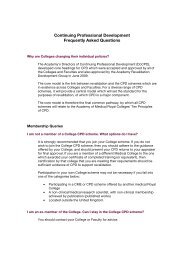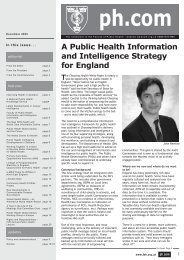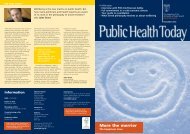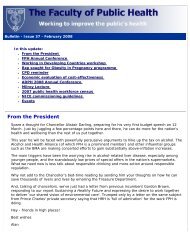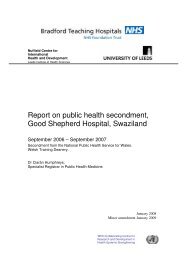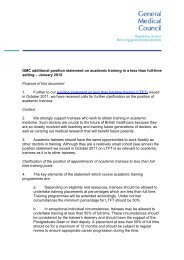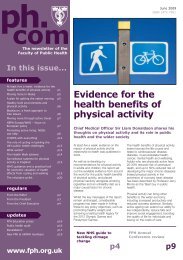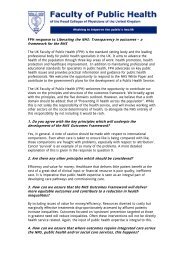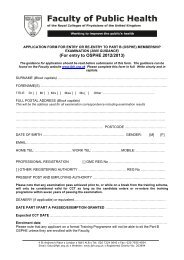A Chronology of State Medicine, Public Health, Welfare and Related ...
A Chronology of State Medicine, Public Health, Welfare and Related ...
A Chronology of State Medicine, Public Health, Welfare and Related ...
You also want an ePaper? Increase the reach of your titles
YUMPU automatically turns print PDFs into web optimized ePapers that Google loves.
1861 Cont - 1862<br />
1861 cont A Select Committee received considerable criticism <strong>of</strong> the role <strong>of</strong> relieving<br />
<strong>of</strong>ficers as intermediaries in the obtaining <strong>of</strong> medical attendance. See 1864.<br />
<strong>Public</strong>ation for the Workhouse Visiting Society <strong>of</strong> "A Plea for the Destitute Incurable"<br />
by Frances Power Cobbe (1822-1904). The plea was that the chronic sick should be separated<br />
from other inmates <strong>of</strong> the workhouses <strong>and</strong> be given extra comforts. There were about 80,000<br />
people in the category <strong>of</strong> "destitute incurable" in the institutions. A petition to the House <strong>of</strong><br />
Commons included signatures from leading physicians <strong>and</strong> surgeons <strong>of</strong> London hospitals<br />
who agreed that such people should not be kept for more than a brief period in any hospital<br />
established for the cure <strong>of</strong> the sick. See 1866.<br />
Nurses were appointed for the first time to the staff <strong>of</strong> a Poor Law hospital (Liverpool)<br />
<strong>and</strong> Agnes Jones (1832-68) was appointed the first superintendent.<br />
1862 Lunacy Acts Amendment Act (25&26 Vict., c.111) set out conditions <strong>and</strong> regulations<br />
for the establishment, management <strong>and</strong> inspection <strong>of</strong> county asylums. See 1877.<br />
Lunacy in Scotl<strong>and</strong> Act (25&26 Vict., c.54) regulated the care <strong>and</strong> treatment <strong>of</strong><br />
lunatics, <strong>and</strong> the provision <strong>and</strong> maintenance <strong>of</strong> lunatic asylums in Scotl<strong>and</strong>. See 1913.<br />
Lunacy Regulation Act (25&26 Vict., c.86) amended the 1853 act in respect <strong>of</strong> the<br />
pro<strong>of</strong> <strong>of</strong> insanity <strong>and</strong> disposal <strong>of</strong> the property <strong>of</strong> lunatics.<br />
Police (Scotl<strong>and</strong>) Act (25&26 Vict., c.101), a major act <strong>of</strong> 449 clauses, regulated the<br />
policing <strong>of</strong> the towns <strong>and</strong> populous places in Scotl<strong>and</strong>; <strong>and</strong> provided for the lighting,<br />
cleansing, paving, draining <strong>and</strong> supply <strong>of</strong> wholesome water, <strong>and</strong> for promoting the public<br />
health. See 1867.<br />
House <strong>of</strong> Lords Select Committee on Injury from Noxious Vapours called for an<br />
inspectorate free from local control. See Alkali Act 1863.<br />
Manchester <strong>and</strong> Salford Ladies <strong>Health</strong> Society appointed the first "health visitors",<br />
being women <strong>of</strong> the working class, to visit the poorer people <strong>and</strong> teach them the rules <strong>of</strong><br />
health <strong>and</strong> child care. See 1891.<br />
Henry Littlejohn (1828-1914, later Sir, lecturer in medical jurisprudence <strong>and</strong> police<br />
surgeon in Edinburgh) was appointed the first medical <strong>of</strong>ficer <strong>of</strong> health in Edinburgh with the<br />
support <strong>of</strong> the presidents <strong>of</strong> the Royal Colleges <strong>of</strong> Physicians <strong>and</strong> <strong>of</strong> Surgeons.<br />
John Simon (see 1848) in his fourth annual report to the Privy Council drew attention<br />
to the ill effects <strong>of</strong> much factory work <strong>and</strong> concluded that "to be able to redress that wrong is<br />
perhaps among the greatest opportunities for good which human institutions can afford".<br />
St Thomas' Hospital moved from London Bridge to Surrey Gardens, opposite the<br />
Houses <strong>of</strong> Parliament.<br />
Training for midwives, initiated by Florence Nightingale (see 1854), started at King's<br />
College Hospital, London. This was ab<strong>and</strong>oned in 1868 following an epidemic <strong>of</strong> puerperal<br />
sepsis. See 1869.<br />
George Peabody (1795-1869, merchant <strong>and</strong> banker, born in USA) set up the Peabody<br />
Trust to provide tenements for workers <strong>and</strong> their families in London. See 1865.<br />
The Senate <strong>of</strong> London University decided by a single majority vote that its powers to<br />
confer degrees on "all classes <strong>and</strong> denominations ... without any distinction whatsoever" did<br />
not extend to females. Consequently Elizabeth Garrett (1836-1917) was debarred from<br />
entering the University's examinations. See 1865 <strong>and</strong> 1878.<br />
The rapid growth in railways since 1840 had linked all the main cities <strong>and</strong><br />
revolutionised passenger <strong>and</strong> freight transport. London to Edinburgh by rail now took 10½<br />
hours; this was reduced to 8½ in 1888.



